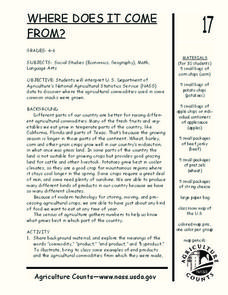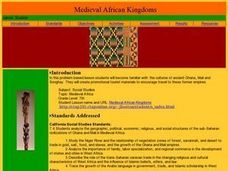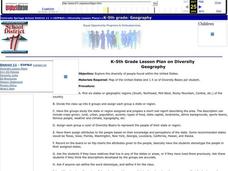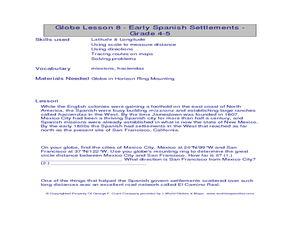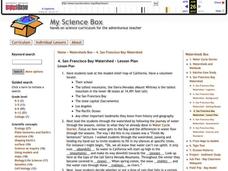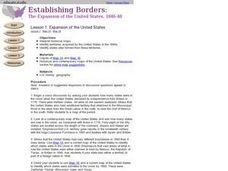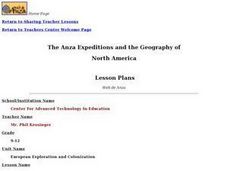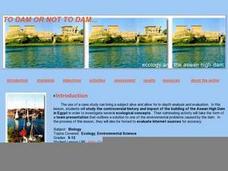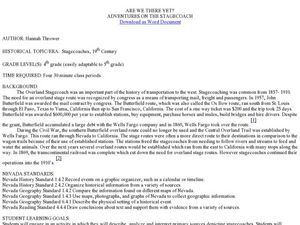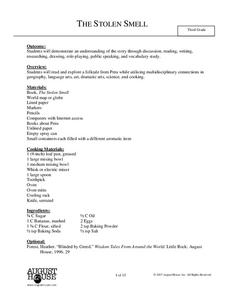Curated OER
Where Does It Come from?
Students read articles about various agricultural products and create a map using the statistics in the article. In this agricultural statistics lesson, students look at the geography of the country and which products come from the...
Curated OER
Mapwork: A Place In the News
Students determine how to find geographic information about places they read about in the news. In this geography lesson, students look at political and physical maps to determine the difference. They access maps online to find the...
Curated OER
Drought Threatens Huge Man-Made Lake
Students locate Lake Mead, then read a news article about Lake Mead drying up and how that would effect water and power supplies to the region. In this current events lesson, the teacher introduces the article with a map and vocabulary...
Curated OER
Medieval African Kingdoms
Seventh graders examine the geography and political history of West Africa. They role-play as applicants to a company that transports customers to any historic time period. Working in teams, they create promotional products encouraging...
Curated OER
More Than One Grain of Rice
Learners explore mathematics, geography and agriculture by studying world rice production. In this production of rice instructional activity, students read One Grain of Rice and use a worksheet grid to calculate how much rice was...
Curated OER
Diversity
Students work in groups to research and prepare an oral report about a region. For this regions lesson, students find out about the geography, population, state capitals, and landmarks. Students assign attributes to the...
Curated OER
Rice Farming in Texas
Third graders explore how rice farming came to Texas. In this rice farming lesson, 3rd graders discover the history of how farmers began to grow rice in the United States. Students color code maps and create a timeline for rice farming...
Curated OER
Gray Whales on the Move
Students study whale migration and their natural history. In this migration lesson plan students plot whale migration on a map and describe their ecosystems.
Curated OER
Zoo Welcomes Baby Animals
Learners engage in activities to gain a better understanding of endangered animals. In these animal lessons, students use vocabulary and comprehension skills to gain a better understanding of endangered animals. They also watch video...
Curated OER
Globe Lesson- Early Spanish Settlements
Students use a globe. In this geography and early settlements lesson, students learn about the settlement of missions and haciendas in New Mexico. Students locate Mexico City and San Francisco on the globe and determine the distance...
Curated OER
San Francisco Bay Watershed
Students examine relief maps of California and discuss the San Francisco Bay watershed. Discussion continues with the class helping complete a journey of water through seasons in a "finish my sentences" style lecture. They label rain...
Curated OER
The Expansion of The United States, 1846-1848
Students interpret historical maps,identify territories acquired by the United States in the 1840s. Also they identify states later formed from these territories. The primary sources for the lesson are the maps found in the lesson's...
Curated OER
States of Fitness
Learners participate in physical activities coordinating to divisions on a map.
Curated OER
Snacks in a Bag
Learners brainstorm a list of their favorite snacks. Using clues, they identify the type of snack being described. On a map, they identify and locate the origin of the ingredients used to make it. They write their own clues for...
Curated OER
Spanish Colonization: The Anza Expedition
Students research the Spanish explorations and North American geography. They create web pages based on their study.
Curated OER
Law of Superposition
Students identify the law of superposition and it states that beds of rock in a series are laid down with the oldest at the bottom and younger layers on the top. They construct a legen for a block diagram and construct a block diagram...
Curated OER
Coming of Age During Japanese Occupation: Richard E. Kim's Lost Names: Scenes from a Korean Boyhood
Explore the implications of the Japanese occupation of Korea during World War II. Learners read Lost Names: Scenes from a Korean Boyhood, participate in classroom discussions about the novel and keep journals in which they respond to...
Curated OER
Where Does It Come From?
Learners explore where agricultural commodities used in snack foods are grown. They choose a snack food and locate the top five states that produce the food that the snack is made from.
Curated OER
To Dam or Not to Dam
Young ecologists explore the Aswan Dam in Egypt via the internet. Each collaborative group is assigned a specific article about the ecological impact of the dam. Then they prepare a presentation to share with the rest of the class. Some...
Curated OER
Riding a Stagecoach in the 19th Century
Students research the differences between traveling on a stagecoach and wagon trail in the 19th century. In this historical lesson, students discover the uses of stagecoaches and wagon trails in the 19th century, then decide which one...
Curated OER
Where In the World Am I?
Learners identify their location in the world after studying latitude, longitude, relative location, and absolute location. They use assigned web site to find information to make a flipbook that answers questions about their location in...
Curated OER
What is Kwanzaa?
Describe the general characteristics of Kwanzaa after reading Seven Candles of Kwanzaa. For this Kwanzaa instructional activity, learners study the principles of the Kwanzaa holiday and interpret the principles through music and...
Curated OER
The Stolen Smell
Third graders read the story The Stolen Smell, and complete language arts activities based on the book. In this The Stolen Smell lesson plan, 3rd graders complete activities such as discussion, reading, researching, drawing, role...
Curated OER
Mexican and American Views of Texas
Students study the territorial status of Texas in 1830, 1840, and 1846 and interpret an historical timeline. They develop a general statement of Mexican and American views of Texas.
